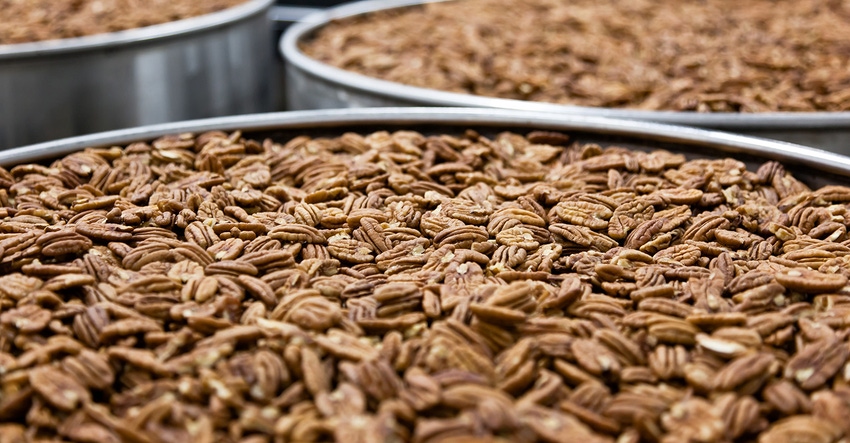
If you charge the guy next door the same fee you are paying yourself, that sounds fair. But if you let the guy in the next state play the same game you are — without paying that fee — that’s where the fairness gets unbalanced.
At least that’s the way the National Pecan Federation, the advocacy group for the pecan industry in Washington, feels about the current status where growers and handlers in the domestic pecan industry pay an assessment to the American Pecan Council for research and product promotion — but foreign-grown pecans imported into the U.S. pay no such assessment.
The National Pecan Federation has asked the U.S. Department of Agriculture to establish a research and promotion program to strengthen the place of pecans in the market and to develop new uses for the nuts.
The proposal calls for an initial assessment rate of two cents per pound of inshell and four cents per pound of shelled domestic — as well as imported — pecans. According to NPF, “Under this program, growers and handlers will not pay any more in assessments than they are currently paying. Additional funds would come from imported pecans.”
USDA is currently analyzing the proposal and if it finds the request justified, will publish the proposed rule in the Federal Register with a public comment period asking for input from industry members and interested stakeholders.
In a posting on the proposed program, horticulture professor and pecan specialist at the University of Georgia, Lenny Wells, writes, “Due to the serious effect the importation of nuts into the U.S. market has on grower market price for pecans, growers should educate themselves on this new effort and contribute comments as the public comment period allows.”
The American Pecan Council, founded in 2016 and based in Fort Worth, Texas, publicizes itself as a “group of passionate growers and shellers whose life work is dedicated to growing, harvesting and processing America’s only major native tree nut.”
In Beijing, the China Agricultural Consultants at CnAgri reported that, “the pecan marketing order could provide much-needed industry support.” Their story noted that while almond crops have grown more than 30 times larger over the last 50 years, increasing the farm value of that nut by a factor of 133, “pecan farm value increase was by a factor of 10. This order will bring marketing clout needed since recent Chinese demand for pecans spawned new plantings.”
The order would authorize data collection and research and promotion activities while focusing on nut grade, size, quantity, and package and container regulations. Economic studies have shown the investment of 1 to 3 cents per pound depending on nut category would be more than recouped through marketing.
A ‘national voice’
Quoted in the release is Arizona grower Bruce Caris, Chief Operating Officer of Green Valley Pecans, a grower-sheller operation in Southern Arizona.
“One of the challenges for the pecan industry is that it is spread out geographically and although there are separate associations within the growing regions, the proposed marketing system would provide a communications center that would be a national voice,” he said.
Pecans are grown in 15 states including California, Arizona, New Mexico, and Texas. In notifying pecan industry participants about the new program, the National Pecan Federation noted, “Our experience involving dozens of crops as well as our own has shown that promoting the product is an effective way to increase crop prices and correct future supply and demand imbalances.”
The proposed 17-member American Pecan Promotion Board [APPB] would have the authority to assess both domestic and imported pecans. At current import levels, that would almost double research and promotion budgets by bringing in an additional $4 to $6 million a year.
For more news on tree nuts as reported by growers and farm advisors, subscribe to the Tree Nut Farm Press e-newsletter.
Read more about:
PecansAbout the Author(s)
You May Also Like




